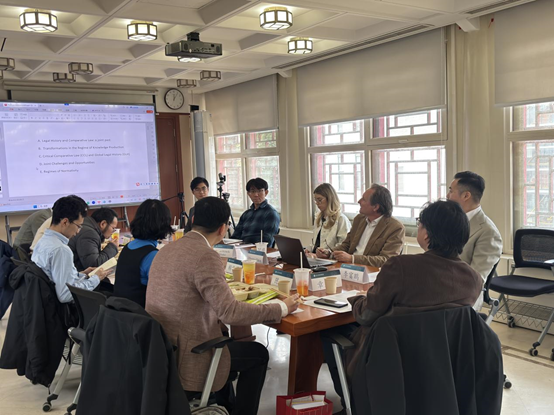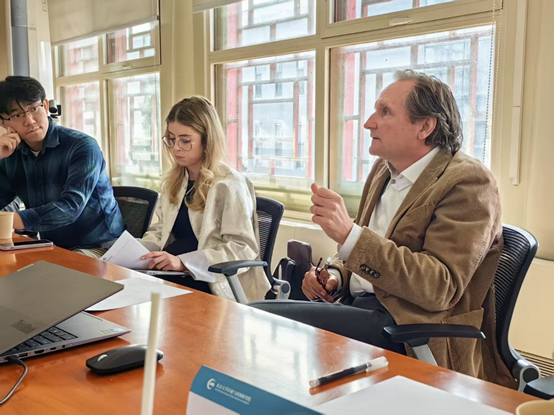
The 46th lecture of the “Adventus Amicorum” salon series was held on March 4, 2025, by the Institute of Area Studies, Peking University (PKUIAS). During the salon, Prof. Thomas Duve, director of the Max Planck Institute for Legal History and Legal Theory and professor for Comparative Legal History at the Faculty of Law, Goethe-Universität Frankfurt, shared his thoughts on the topic, “Global Legal History and Comparative Law.” The lecture was moderated by Zhang Yongle, deputy director of PKUIAS. Other participants included Li Fupeng (Director, Institute of Legal History, China University of Political Science and Law), Li Honghai (Professor, Law School, PKU), Chen Yifeng (Associate Professor, Law School, PKU), Lai Huaxia (Assistant Professor, School of International Relations, PKU), Wu Xunxiang (Assistant Professor, Law School, PKU), Cao Wenjiao (Lecturer, Department of International Law, China Foreign Affairs University), and Wu Jingjian, (postdoctoral fellow, Law School, PKU). Also present in the audience were Ku Haochen, Sandra Michelle Röseler, and Liu Xinran (doctoral candidates, Max Planck Institute for Legal History and Legal Theory).
Prof. Duve began by giving examples of how the world is different when viewed from different perspectives. As a German scholar, he said he inevitably was influenced by his European perspective, and therefore he very much looked forward to hearing the views of the Chinese scholars attending the event. Having prefaced his remarks in this way, he then systematically elucidated the interaction between legal history and comparative law and how they were developed and transformed in the context of globalization. He then discussed in depth the joint past of legal history and comparative law, transformations in the regime of knowledge production, Critical Comparative Law (CCL) and Global Legal History (GLH), and joint challenges and opportunities in the field, and finally put forward his initiative, “Regimes of Normativity.”
Duve began by pointing out that legal history and comparative law have been inseparable since the embryonic stage of the discipline. In traditional legal research, jurists have always solved practical problems through historical comparison, forming a research paradigm represented by the Savigny School of Historical Law. This school attempted to construct a “universal grammar” of law, and its historical comparative methodology became the core approach in 19th-century European legal studies. It was not until the early 20th century, with the transformation of traditional legal methodology, that legal history and comparative law gradually differentiated into independent disciplines.

The second part of the lecture focused on transformations in the regime of knowledge production since the late 20th century. Duve analyzed the profound impacts of internationalization and digitization on disciplinary development: the rise of transnational legal practices (WTO, sports, Internet etc.) challenged traditional state-centered legal paradigms, while postcolonial theory prompted academia to re-examine Western-centric research frameworks. He noted that this paradigm shift had fostered new academic communities, driving comparative law and legal history to transcend geographical and national boundaries.
When elaborating emerging theoretical frameworks, Prof. Duve particularly emphasized distinguishing between critical comparative law and global legal history. While both sought to overcome Western-centrism, their methodological approaches differed: critical comparative law focused on power critiques in legal transplantation, emphasizing equal participation of non-Western traditions; global legal history adopted global history methodologies, advocating for reconstructing the complex processes of legal dissemination through temporal-spatial dimensions. He specifically mentioned that comparative legal practices by Chinese scholars like Zhang Taisu demonstrated early non-Western reflections on Western legal discourses.
Regarding rethinking the nature of law, Duve proposed a “normative regimes” theoretical framework, criticizing traditional legal scholarship’s view of law as an independent normative system. He argued that law should be examined within broader social normative networks. Through analyzing normative practices of Latin American indigenous communities, he revealed how existing legal concepts obscured plural governance systems, emphasizing the need to break through colonial discourses like “legal barbarians” and establish more inclusive knowledge production mechanisms.
Finally, Duve proposed replacing traditional state-centric legal perspectives with a “normative regimes” research approach. This methodology advocates focusing on normative production and knowledge-based practices, expanding observational subjects from singular legal domains to multiple social relational fields including security, labor, and power, aiming to reconstruct the knowledge framework of legal history and comparative law through interdisciplinary approaches.
During the discussion session, discussants engaged Prof. Duve in an erudite exchange about the implications arising from his lecture. Lai Huaxia, drawing from her interdisciplinary background in international law training and international relations research, raised three questions: (1) How to define “regime” and how to integrate legal orders with non-legal orders in global legal history research; (2) How to define so-called “knowledge-based practices” and how to establish boundaries for this core concept; (3) Under the perspective of global legal history, when introducing non-state actors into new conceptual frameworks, how to avoid methodological limitations.
Li Honghai observed that legal history development had undergone two phases: the first phase primarily involved European countries compiling their own codes based on historical and social realities, while the second phase focused on the global diffusion of European continental law. He then proposed his own approach for legal history’s next developmental stage: through scholars and lawyers’ efforts, critically integrating foreign norms, values, and legal techniques adapted to local societies with indigenous norms, thereby synthesizing a legal framework capable of global exchange while remaining attuned to local lifestyles—a process he noted as consistent with common law lawyers’ longstanding work.
Chen Yifeng acknowledged Duve’s contributions in transcending traditional legal history and comparative law scholarship, and engaged him in discussion regarding three aspects: the selection of normativity, the rationale for emphasizing knowledge-based production, and the future of global legal history.
Wu Xunxiang raised two questions from alternative perspectives: (1) Whether the proposal of “normative regimes” might pose greater challenges for researchers lacking theoretical background, particularly those from non-central regions; (2) Whether challenging law’s central position might generate risks.
Cao Wenjiao discussed the relationship between normativity and knowledge with Duve, while raising practical concerns about young scholars’ academic survival when transcending academic traditions.
Wu Jingjian raised career development concerns, noting that young scholars frequently face critiques about insufficient legal normativity when publishing global legal history articles.
Li Fupeng expressed gratitude to Duve and PKUIAS, observing that while establishing new fields remains challenging, Chinese scholars are increasingly embracing global legal history and will inevitably contribute more Chinese perspectives to this discipline.
Finally, Zhang Yongle emphasized that as China actively develops foreign-related legal affairs, legal studies and area studies can be organically integrated. He noted that Duve’s global legal history research provided an exemplary model in this regard, and expressed anticipation for deeper future collaborations.


